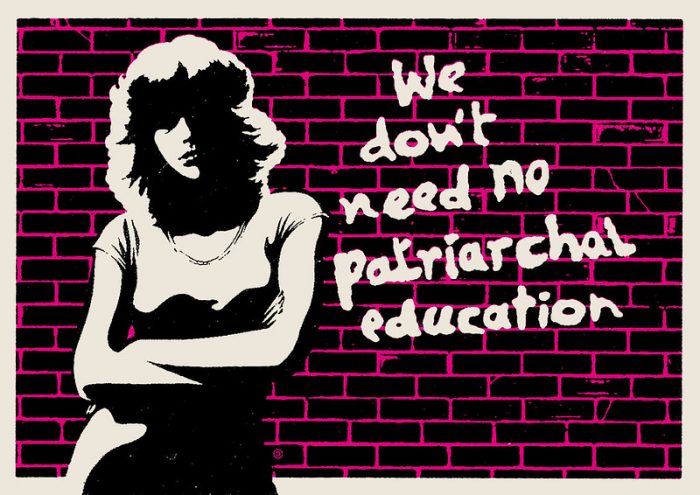The text came through in the middle of the night.
“She’s extremely selfish…I’m so over her ego.”
It was about me, not for me.
I didn’t hesitate to respond: “I think you meant to send that to someone else.”
She confirmed and refused to apologize.
I had “dared” to use my writing voice on a public platform and to share it on social media. More than once. It apparently irritated my now-former friend, who had taken to text to complain to someone else about my purported “arrogance.”
One piece of writing was to be celebrated with squeals and shrieks. But consistent sharing? That was arrogant, selfish, and egotistical.
Women in our culture are celebrated and cheered on when we use our voices. “Go girl!” “You’re the boss!” Insert hearts, fire emojis, and many exclamation points!!!!
But when we do it regularly, we are silenced and chided by way of the social shaming my friend enacted.
We are gossiped about for our ambition, for our failure to keep our focus on others, for making someone else uncomfortable. For our strength, our conviction, and our power.
We are locked out: punished by social isolation from others.
On the flip side, we shine a light on the women in society who “never hurt anyone” and “who never complain.” We admire them as the backbone of society.
I recently attended a funeral where such phrases were said about the mother, who had died too young. I whispered to my husband, “Don’t you dare say those things about me if I die first. They’re not true about me, and they’re not true about her, either.”
We applaud women who credit others, handing away their efforts, aka: “I owe it all to so-and-so,” rather than offering appropriate co-stewardship or simply accepting praise with a “thank you!”
The gatekeepers of social decorum are our institutions and hierarchies. They are our businesses, our social networks, our platforms, our homes. And, often, women do the daily policing–our mothers, our friends, our co-workers.
My mom once said to me, “We’re not supposed to rock the boat. We’re supposed to keep things steady. That’s our job.”
I don’t think that she’ll ever understand how triggering this comment was for me. Because what I heard her say was while there was space for my brothers to get angry, to have loud opinions, or to argue over politics, I, the only other woman in our family, was tasked to keep the peace. My opinions and thoughts didn’t matter as much as my role as a peacekeeper.
My brothers had the space to be loud, to get in trouble, to stand over me with a fist clenched because I once dared to suggest that he not give more sugar to his son, who was bouncing off the walls.
To talk to my mom about these things is to meet a wall. She defends her boys while leaving me to protect myself. In her eyes, women are supposed to be the strong ones, and she, along with the rest of society, expects us to be the individual containers for the expressions and transgressions of men.
These beliefs run in all women’s blood. These are societal beliefs, perpetuated by the poisonous roots underneath the patriarchal river in which we bathe.
This tiered power system plants beliefs about the skills, capabilities, tendencies, and qualities of men and women and assigns roles to each based on these qualities. The rules, norms, and structures we are to fit inside are “for our own good,” we are told, as well as the good of everyone around us.
In order to uphold the patriarchy, men in power continue to hand down that power from one member of the inner circle to another.
But women also guard these gates—women who benefit from their proximity to this power and who believe that other women are a threat to it.
And women police each other in many subtle but effective ways.
We remind each other that we ought to remain humble, appreciative. We must be positive, pleasant, supportive, and timid. Sharing our opinions is to be a step of courage, not a way of life. And we are not to have an “ego.”
We talk about our egos as if they are evil parts of ourselves, and to let others see them is a supposedly shameful thing.
We tell each other that we should love to do our work for the sake of the work, not the money. As if work for the “sake of it” is nobler than wanting to be paid.
As a single woman, I’ve been given instructions to “let” men lead, whereas men I’ve asked say they would love to be asked out by a woman.
Female advice for women in emotional disputes with men is always to make sure the man is comfortable: “We know men need space.” Nobody is protecting women’s space nor offering sexist reasons why he can’t speak for himself or ask for it.
Women offer women coaching that is intended to help, but instead upholds the very structure we intend to take down.
In these ways and others, women are often even better gatekeepers of the patriarchy than men are.
Imagine any man ever suggesting with credibility that he just loves the work for the work, that he doesn’t care if he gets paid or not, that he’s going to check his ego at the door each day before sitting down to work.
Instead, men are praised for ambition, protecting their time in return for money, and being strategic. There are no protesting shrieks about a man being arrogant or egotistical when penning an article, no shock or shame in his repetition of demonstrating professional expertise, and no comments about how they have no other goal than to be of service.
For men, there are no broken friendships or gossip over these things. Only praise and validation.
We are often unaware that the sensations in our bodies that drive us to want to “help others” are ones of fear and shame. We feel a compulsion to advise and coach in ways that are driven by a desire to be of benefit to others, but actually benefit the status quo.
We are handing down the very rules we wish to abolish every time we tell another woman:
Make sure you ask in a fun and playful way.
Keep the tone of your conversation light.
Don’t talk about work.
Don’t worry about the money.
Do not be angry, do not raise your voice.
Just don’t say anything.
We say these things because we don’t want our sisters, daughters, or friends hurt. But we don’t see that in tone policing, we are reinforcing the patriarchy.
We would never dream of telling a man not to seek compensation for his work.
We ought not to tell women the same.
We would never remember a man’s life by his talent for never complaining.
We ought not to speak that way about women.
We would never call a male artist arrogant simply for publishing and promoting his work.
Why are we ascribing it to women?
We can make changes through mindfulness. Having awareness of how we interact with ourselves and others, the sensations in our bodies, and what instructions, tips, and advice we share in the name of community.
Before we give advice or gossip about others, can we pause and take a moment to connect to our own bodies?
Are we triggered?
Are we feeling fear or shame?
Are we repeating instructions we have been told that once made our stomach drop, but we learned to adapt to?
Once we are in our bodies, we can incorporate more mindful awareness.
Would we say this to a man?
Is this advice or comment authentic or is it something we believe we are supposed to say or think?
Are we saying something we know is true or are we repeating something we wish felt true?
Can we pause before saying this and think about whether this serves us, the patriarchy, men, or if it truly serves the person we are sharing advice with?
We don’t want to be peacekeepers. We don’t want to “hold the line,” or make space for the men to have their say without saying ours. We’re okay rocking the boat. We don’t mind challenging the status quo.
And we’re okay promoting our work, asking for compensation, and being a boss. Just like a man would. If that makes us “in our ego,” then so be it.
I kept writing.
And I never talked to my “friend” again.
~
For more from Janis.
For more from Keri.


 Share on bsky
Share on bsky





Read 117 comments and reply